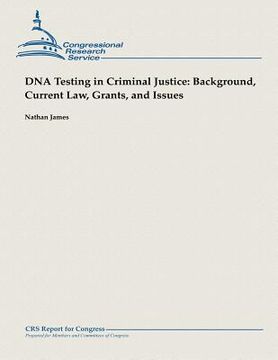DNA Testing in Criminal Justice: Background, Current Law, Grants and Issues (en Inglés)
Reseña del libro "DNA Testing in Criminal Justice: Background, Current Law, Grants and Issues (en Inglés)"
Deoxyribonucleic acid, or DNA, is the fundamental building block for an individual's entire genetic makeup. DNA is a powerful tool for law enforcement investigations because each person's DNA is different from that of every other individual (except for identical twins). DNA can be extracted from a number of sources, such as hair, bone, teeth, saliva, and blood. As early as the 1980s, states began enacting laws that required collecting DNA samples from offenders convicted of certain sexual and other violent crimes. The samples were then analyzed and their profiles entered into state databases. Meanwhile, the Federal Bureau of Investigation (FBI) Laboratory convened a working group of federal, state, and local forensic scientists to establish guidelines for the use of forensic DNA analysis in laboratories. The group proposed guidelines that are the basis of current national quality assurance standards, and it urged the creation of a national DNA database. The criminal justice community began to utilize DNA analyses more often in criminal investigations and trials, and in 1994 Congress enacted legislation to authorize the creation of a national DNA database. Federal law (42 U.S.C 14132(a)) authorizes the FBI to operate and maintain a national DNA database where DNA profiles generated from samples collected from people under applicable legal authority and samples collected at crime scenes can be compared to generate leads in criminal investigations. Statutory provisions also authorize the collection of DNA samples from federal offenders and arrestees, District of Columbia offenders, and military offenders. State laws dictate which convicted offenders, and sometimes people arrested for crimes, will have profiles entered into state DNA databases, while federal law dictates the scope of the national database. Increasing awareness of the power of DNA to solve crimes has resulted in increased demand for DNA analysis, which has resulted in a backlog of casework. Some jurisdictions have started to use their DNA databases for familial searching, which involves using offender profiles to identify relatives who might be perpetrators of crimes. In addition to solving crimes, DNA analysis can help exonerate people incarcerated for crimes they did not commit. Congress has authorized several grant programs to provide assistance to state and local governments for forensic sciences. Many of the programs focus on providing state and local governments with funding to reduce the backlog of forensic and convicted offender DNA samples waiting to be processed and entered into the national database. Since FY2006, Congress has appropriated approximately $785 million for backlog reduction and laboratory capacity enhancement programs. However, other grant programs provide funding for related purposes, such as offsetting the cost of providing post-conviction DNA testing. In the 1990s and the early part of the last decade, most of the debate in Congress focused on the scope of DNA databases, reducing the backlog of DNA casework, and providing access to post conviction DNA testing. Most of the debate about the scope of DNA databases faded away with the enactment of the Violence Against Women and Department of Justice Reauthorization Act of 2005 (P.L. 109-162), which expanded federal collection statutes to include anyone arrested or detained under the authority of the United States. The act also expanded the scope of the national database to include DNA profiles of individuals arrested for state crimes. However, concerns about the backlog of DNA casework and access to post-conviction testing have persisted. In addition, new issues related to the use of DNA in criminal justice have emerged, including whether (1) DNA databases should be used to conduct familial searches, (2) sexual assault evidence collection kits (i.e., "rape kits") should be standardized, and (3) there should be national accreditation standards for forensic laboratories.

